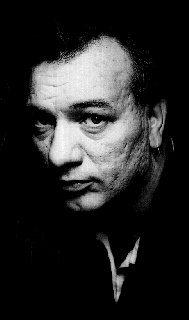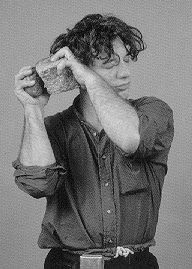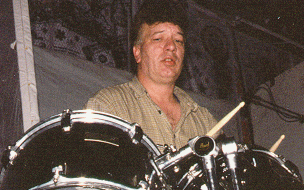

Jester: Are you excited about the upcoming tour, which is your first since touring with Einstruzende Neubauten in 1992?
F.M.: I was actually in the US in 1996 when I was working on the KMFDM album "Extort. The last tour I was on in the US was in 1995 with Casper Brotzmann in support of the "Merry Christmas" album. However, I am very excited to be touring with my own band. I am excited to go back on stay, because apart from a few single performances, I really haven't been on-stage since 1995.
Jester: Most of your previous solo work consists of stage music and performance art. What can we expect from your live show? What will you be performing?
F.M.: I've been working on commissioned music for the last eight years and I've gotten a bit sick of being inside of others people's heads writing their music. I am working on an entire array of new material commissioned by myself and we will be presenting some of those on tour.
Jester: Will any of that material be released as an album?
F.M.: I sort of have to start from scratch again since I left Neubauten. I have to find a new label and other sorts of things. I hope that there are labels that are interested in releasing an album of mine in the future.
Jester: Will you be contributing to any of the live Pigface material?
F.M.: There isn't anything planned at the moment, but who knows what will happen. The plan is to come over to the North America and sightsee and perform music.
Jester: How did you become so involved with commissioned music?
 F.M.: All of the radio dramas that I participated in were
financially commissioned by German state radio. However, the idea to create
such a work came from myself and the other composers. We decided to write a
piece about Dante or Hamlet. I managed to meet up with Andreas Ammer who had
been involved with several other radio dramas. We both wanted to
compose a whole new combination of music and a radio drama and we went from
there.
F.M.: All of the radio dramas that I participated in were
financially commissioned by German state radio. However, the idea to create
such a work came from myself and the other composers. We decided to write a
piece about Dante or Hamlet. I managed to meet up with Andreas Ammer who had
been involved with several other radio dramas. We both wanted to
compose a whole new combination of music and a radio drama and we went from
there.
Jester: Were the radio dramas performed live, or were they recorded before the performance?
F.M.: Both. Radio Inferno was completely written in the studio while Apocalypse was done completely live.
Jester: Many of those radio plays revolve around either political or mythological references. Why have you chosen those two topics to work with so heavily?
F.M.: Different reasons. Before I started working on radio dramas, I participated in the reworking of old Greek plays like Prometheus. When I started working in the theater, I wanted to really immerse myself in the work and I decided the best way to was to obtain a fresh, personal look at the material. I wanted to get to the root of the meaning of a certain play. So instead of using other authors interpretations of the stories, I wanted to attack the compositions from a more original and personal level. I also really enjoyed working on those stories.
In the case of Deutsche Krieger, I was really interested in reworking and rethinking German history. I wanted to hear what history sounds like instead of looking into a history book and reading about it. I wondered what German history would mean to me when I listened to the original source material. So for that release, we only used the original source recordings of the Grammophone from the first World War. We only used radio recording for the source for the second World War and television video for the terrorist portion of the material. When we were researching the different portions of German history for this radio drama, we ended up researching the history of German media instead. That was an unexpected bonus. It was very interesting to experience the different sounds from each era.
Jester: Did you have any political problems trying to receive government funding for the Hitler portion of Deutsche Krieger?
F.M.: No. We actually got more negative feedback from working on issues related to the terrorists in the 1970's. We had no problem receiving money for the commission of the first two parts of that production, but we were unable to receive funding for the last part. The government was very uneasy about us working issues surrounding terrorism because there are still German laws that withhold your democratic rights that were passed during the 1970's because of those terrorists. The wounds have not healed yet from that time.
 Jester: Are there any other Stein releases besides Stein
and Konigzucker? Is Stein still an active project?
Jester: Are there any other Stein releases besides Stein
and Konigzucker? Is Stein still an active project?
F.M.: We did three releases. Stein, Steinzeit and Konigzucker. That band consists of three people, of which both other members haved worked with me on Apocalypse Live release. We are still together but there are no plans to work on new material at this time.
Jester: What was it like working with Casper Brotzmann on the Merry Christmas album?
F.M.: I have known Casper for a very long time and he is a great friend of mine. The first time we met was around 1988 and we had always talked about writing an album together. It took several years, but one day he called me up and we wrote that entire album in about four hours.
Jester: What lead to your decision to finally leave Neubauten after so long?
F.M.: Boredom. I was with Neubauten for 15 years and we had some really good times together. We toured the world a few times, we changed the face of music a little bit, and that was the most I could get out of the band. Neubauten wasn't anything I would bleed for anymore. It became an institution.
The name Einstruzende Neubauten does mean something. It means that you take down boundaries and that you change your approach to music all the time. That wasn't happening for me at the end. I wasn't happy carrying on with the band because I was no longer feeling innovative.
Jester: How did you arrange to have your material licensed via Invisible Records in North America?
F.M.: I met Martin Atkins a very long time ago during the beginning of the 80's. Then, years later, I was looking for North American distribution for Radio Inferno, Deutsche Krieger, Sensation Death and Odysseus 7 and my management got in contact with Martin again.
Martin asked me to come over and tour to help promote the release of the material and I agreed. I am very eager to see what America is up to these days since right now, all I can do is read about it.
Jester: How did you first get involved with writing and composing music?
F.M.: It always seemed to be natural for me to make noise. Music was something with which I could express myself the best. So it seemed like the right thing to do. Essentially, I ended up making a great deal of noise to enjoy the silence in between.
Jester: Have you ever had any type of formal musical training?
F.M.: No.
 Jester: Have you felt that it has helped you to write music
because you are not constrained by any rules of composition?
Jester: Have you felt that it has helped you to write music
because you are not constrained by any rules of composition?
F.M.: Yes. Sometimes it is a limitation to not be trained, but most of the time I feel much more freedom to do what I want to do, instead of to be constricted by a set of musical laws. Over the years I met so many people, that if I ever wanted to have something printed or scored, I had people who could do it for me. So it was never much of an issue.
Jester: What is your favorite commission work that you have scored? Why that piece?
F.M.: I really enjoy working with films, but nothing that I have ever released for films has been released yet. I enjoy working with cinema because you can be very precise. The cuts of the film make it simple to be a perfectionist in music up to a frame. However, the music that I enjoy the most of the music that I wrote solely for myself.
Jester: Will any of the music that you have written for films ever be released?
F.M.: I hope so. I have a ton of older material and record companies look at you very strangely when you approach them with a handful of already complete projects. They are very confused about how to sell music when you release a record every month. As soon as I convince the record companies, the music will be released.
Jester: Who are the other members of the live band that will be touring?
F.M.: No one anyone has ever heard about, which is very intentional. For the last 15 years, I have been constantly involved with the same circle of people from Einstruzende Neubauten, Nick Cave & The Bad Seeds, and Crime & The City Solution. All three projects are sort of an extended family. It was starting to become like musical incest. That is why I intentionally chose band members who have never been involved with those three projects or have ever been to North America.
Jester: What does the future hold for F.M. Einheit?
F.M.: Invisible will be releasing another radio drama titled Odysseus 7. I have also collaborated with a Finnish band called Panasonic. That album was supposed to be released in the Spring but it looks like it won't be released until the end of 1998. Lastly, I want to put together an album's worth of material with my new band and release it.